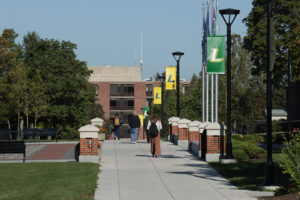Planned Giving
What Will Your Legacy Be?
Alumni and friends who leave legacy gifts to the College become esteemed members of the Evergreen Circle. They, like our students, embody gratitude and determination as they propel us forward. Their generosity underscores our duty to equip students for the future. Some have designated Le Moyne in their wills or trusts, while others have contributed through various means such as IRA, life insurance, or property sales.
Planned Giving, Planned Legacy
Solidify your legacy with a planned gift to Le Moyne.
Join the Evergreen Circle
The Evergreen Circle includes those who have identified Le Moyne in a planning gift. If Le Moyne College is in your estate, please complete our membership form. Completing this form will allow the College to recognize your generosity and to better plan for the future of the College. Upon completion of this form, it can either be mailed to the College or emailed to cogswek@lemoyne.edu.
Gifts of Appreciated Stocks
Giving a gift of long-term appreciated securities is in most cases more tax advantageous than giving cash. This is because capital gains taxes are avoided on gifts of long-term appreciated assets. For taxpayers that will not be able to itemize deductions in a given year, gifts of long-term appreciated securities are now an especially important tool in their tax reduction tool kit.
IRA Charitable Rollovers
If you are 70 ½ years of age or older and have a traditional Individual Retirement Account (IRA), you can use your required minimum distribution to give to Le Moyne through an IRA Charitable Rollover gift.
Retirement Plans (IRA, 401K, 403B)
Retirement accounts like IRAs, 401(K)s, and 403(B)s grow tax-deferred and can accumulate significantly over time. Unlike many other investments, withdrawals from these accounts can incur taxes for both you and your heirs. Naming Le Moyne College as the beneficiary of your retirement account can offer significant tax advantages. By doing so, these assets are excluded from your estate for federal estate tax purposes. Additionally, neither your estate nor your heirs are taxed on the transferred funds, helping you avoid double taxation.
Life Insurance
Consider donating your unneeded life insurance policy to Le Moyne College for a potential charitable tax deduction. With a fully paid-up policy, you can deduct the lower of the replacement value or the premiums paid as of the gift date. Any future premiums paid to Le Moyne also qualify as tax-deductible charitable gifts.
Wills / Bequests
Reviewing your will and estate plan can now help you leave more to loved ones tax-free due to recent changes in estate tax law. Adding a charitable bequest to Le Moyne College creates a philanthropic legacy and provides estate tax relief. Sample Bequest Language: “I give to Le Moyne College, a non-profit 501(c)(3) organization headquartered in Syracuse, New York, $________ or (specific asset) or _____% of my estate to be used for the following purpose: _________." Tax ID#: (15-0545841)
John and I lived our life with this passage from Luke 12:48 in mind: ‘From everyone who has been given much, much will be expected.’”

Your gift today supports the needs of the College and our students.
Planned Giving Glossary
As used in planned giving, refers to the factors used to calculate the value of lifetime payments to individuals or organizations.
Securities, artwork, real estate, or any other property that has risen in value since the donor acquired it. Generally, appreciated property may be donated to Le Moyne College at full fair market value with no capital gains cost.
A contractual arrangement to pay a fixed sum of money to an individual at regular intervals. The charitable gift annuity is a gift to Le Moyne College that secures a fixed lifetime income to the donor and/or another individual.
The sum of an individual’s taxable income for the year – the total at the bottom of the first page of the 1040. Individuals may deduct charitable cash contributions up to 50% of AGI; they may deduct gifts of appreciated securities and appreciated property up to 30% of AGI.
An assessment of the value of a piece of property. Donors contributing real or tangible personal property (art, books, collectibles, etc.) to Le Moyne College must secure an independent appraisal of the property to substantiate the value they claim as a charitable deduction.
The donor’s purchase price for an asset. Mrs. Quinn bought stock for $100 per share and sold it for $175. Her cost basis in the stock is $100 per share.
The recipient of a bequest from a will or a distribution from a trust.
A transfer of property to an individual or organization under a will.
A federal tax on the appreciation in an asset between its purchase and sale prices.
See Basis.
The permanently held capital of a College such as Le Moyne College, used to support ongoing projects and meet institutional opportunities.
A federal tax on the value of the property held by an individual at his death (it’s paid by the estate, not the recipients of the bequests). In contrast , state inheritance tax is applied to the value of bequests passing to beneficiaries; it is also paid by the estate before the distributions are made.
The person named in a will to administer the estate.
The price that an object of property would bring on the open market.
The individual transferring property into a trust.
In a trust, the right to receive income payments for lifetime or a term of years.
The IRS forms that Le Moyne College sends its life income gift participants noting the income paid them by their planned gifts during the tax year.
A planned gift that pays income to the donor and/or other beneficiaries for lifetime, then distributes the remainder to Le Moyne College.
Securities, artwork, business interests and other items of property – as opposed to real property, used in planned giving to refer to land and the structures built on it.
In a trust, the portion of the principal left after the income interest has been paid to the beneficiary(ies). A charitable remainder trust pays income to the donor or other individuals and then passes its remainder to Le Moyne College.
A legal term for the individual or organization who receives the trust principal after the income interest has been satisfied.
The individual making the will.
A transfer of property by the grantor to the care of an individual or organization, for the benefit of the grantor or others.
An individual or organization carrying out the wishes of the person who established the trust, paying income to the beneficiaries and preserving the principal for ultimate distribution.
Questions? Get in touch.









